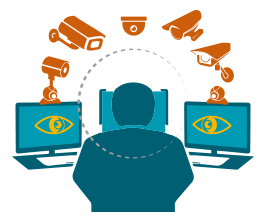Video-surveillance policy - EP
Avis du 17 décembre 2013 sur la notification en vue d’un contrôle préalable concernant la politique de vidéosurveillance adoptée par le Parlement européen (PE) le 20 avril 2013 (Dossier 2013-0471)

Technological progress in the last few decades have made monitoring, tracking and profiling techniques easier, cheaper and more accurate. As a result, surveillance has increased in both the public sector (for law enforcement purposes and public security for example) and in the private sector (for targeted advertising for example). These practices can profoundly affect how individuals think and act, as well as other personal rights (such as freedom of expression or association). Any form of surveillance is an intrusion on the fundamental rights to the protection of personal data and to the right to privacy. It must be provided for by law and be necessary and proportionate.
Avis du 17 décembre 2013 sur la notification en vue d’un contrôle préalable concernant la politique de vidéosurveillance adoptée par le Parlement européen (PE) le 20 avril 2013 (Dossier 2013-0471)
Follow-up Report to the 2010 EDPS Video-Surveillance Guidelines
Opinion on the Proposal for a Regulation of the European Parliament and of the Council concerning type-approval requirements for the deployment of the eCall system and amending Directive 2007/46/EC
Contribution of Peter Hustinx for the LIBE Committee - Public Hearing, Strasbourg